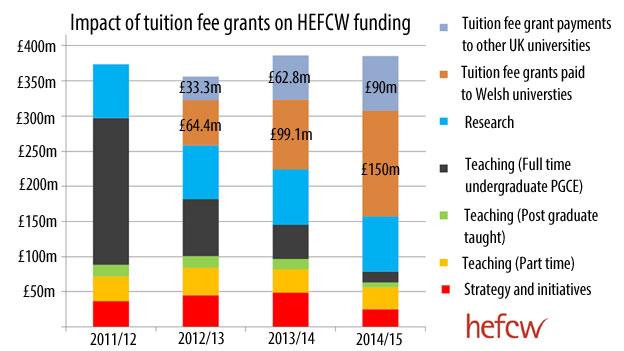HEFCW: Fear universities could fall behind over funding
- Published
David Blaney said universities faced a challenge of less money and more competition
Universities in Wales could fall behind those in the rest of the UK unless the way students are funded changes.
That is the warning from the head of the body holding the purse strings for Welsh colleges, the Higher Education Funding Council for Wales, Hefcw.
Students from Wales pay the first £3,500 of tuition fees but the Welsh government picks up the tab for the rest wherever they study in the UK.
The amount "leaving" Wales to English universities is about £90m this year.
Hefcw's chief executive Dr David Blaney said it means less money is available to invest in Welsh colleges.
Since September 2012 the Welsh government has paid the majority of Welsh students' tuition fees, wherever they choose to study, also cushioning them from increases in fees.
But universities in Wales say this means they are not on a level playing field with their English counterparts.
The original estimate for the amount of tuition fee grant money that would end up in the coffers of English universities this year was £77m.
But BBC Wales understands the actual figure will be closer to £90 million.
Dr Blaney said in England, English students have to get a loan, so the top universities there have £9,000 coming from each student and also funding from the funding council.
"In Wales, a lot of the funding council funding is now spent on the tuition fee grant and that means there's less money available to invest in the Welsh sector than is the case in England," he told BBC Wales in an exclusive interview.
Protecting Welsh students
A Welsh government spokesman said its funding protected Welsh students after the UK government decided to raise tuition fees in England.
"We have been very clear that our tuition fee policy is an investment in the young person and that the choice of institution and course should be driven by individual circumstances not by the cost of fees.
"Wales is a net importer of students, and income to the higher education sector in Wales continues to increase despite the current challenging financial climate."
He added: "Latest statistics show that in 2015-16 £48m more funding will come into the Welsh system than will go out in tuition fee grant to institutions outside Wales.
"In addition to this the number of students attending Welsh HEI's is increasing and the level of debt for Welsh students is considerably lower than their counterparts in England."

WELSH STUDENTS IN ENGLAND
These Welsh students only have to pay £3,500 towards their £9,000 fees in Bristol

Elen believes the tuition fees grant should be for only Welsh students who choose to study in Wales
Elen Wyn Lewis gets £5,500 of her £9,000 fees paid by the Welsh government for studying in Bristol.
"I would have stayed in Wales. But one of the reasons I left Wales was because the grant would still cover me," she said.
"Moving out has been a great experience and I think if you can't move out at this age, you might never get a chance to try it and it gives you that chance.
"Although, I think the grant should only be for those who choose to study in Wales because that would save money for Wales and that should be the priority."

HOW THE NUMBERS ADD UP

How the cost of tuition fees has eaten into HEFCW funding - it has grown because that first year intake of students in 2012 is now in its third year with newer students joining
On average, English universities are charging around £8,500 a year in tuition fees. The highest they can charge is £9,000.
So every time a student from Wales goes to university in the rest of the UK, he or she costs the Welsh government around £5,500. That money leaves Wales.
Mr Blaney warns this could have consequences.
"The concern would be that we end up putting too much money in one part of the activities of higher education to the detriment of the rest and in the end that could cause damage to the capacity of the Welsh sector to deliver for Wales," he said.

BRIDGING THE GAP?

Wales has more students coming in than going out but the gap is narrowing
The important point to remember about the Welsh government's tuition fee grant is that it relies on more students from England, Scotland and Northern Ireland coming to Wales than vice versa.
So far, Wales is still a net importer of students (more coming in than go out) but as you can see from the data above, the gap is narrowing.
Fewer students from England are coming to Wales and more Welsh are leaving to study.
Hefcw and universities in Wales are worried that trend might continue.
We can discount the Scots and Northern Irish because, between them, they account for around 120 students, from a total of over nearly 20,000 a year.

We are 15 months into a review of university funding and student finance in Wales, chaired by the academic, Sir Ian Diamond.
He will make some of his thoughts public later this year, with the full review expected to be published after the next Assembly elections in 2016.
Universities Wales, external - which represents 10 universities - said the review's job was not an easy one given the changes in the UK in recent years.
A spokesman said it was looking to secure the best investment from government as well as ensuring opportunities for students from all backgrounds in accessing higher education.
This is the latest concern about student and university finance.
In 2013, BBC Wales revealed that the body representing universities here had concerns they were losing out compared to their counterparts in England because of the tuition fee grant.
We also revealed concerns expressed by the finance directors of universities here that the grant left "the sector with an uncertain financial future".
- Published22 January 2015
- Published27 November 2013

- Published3 June 2014

- Published19 March 2013
